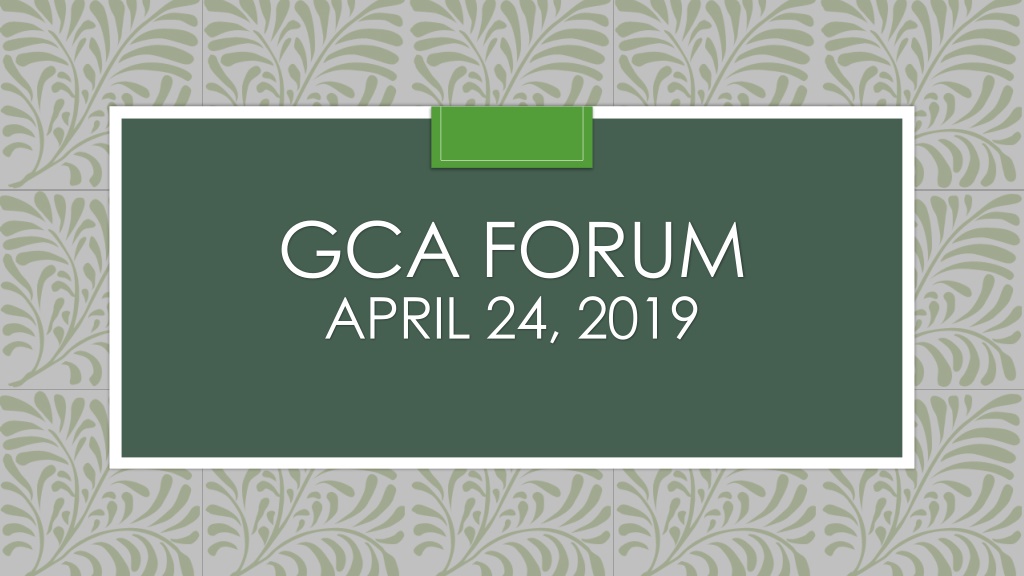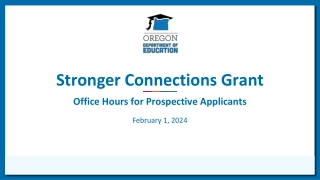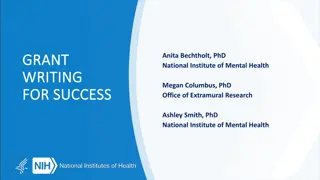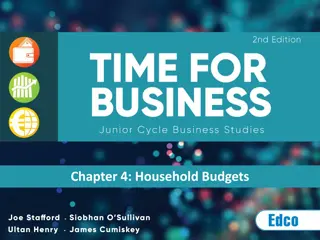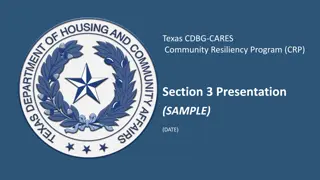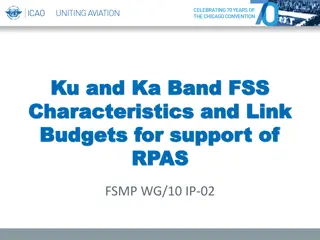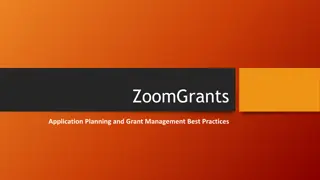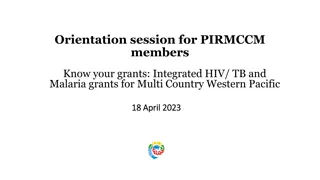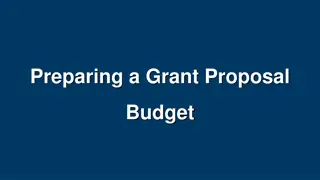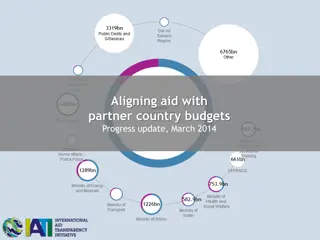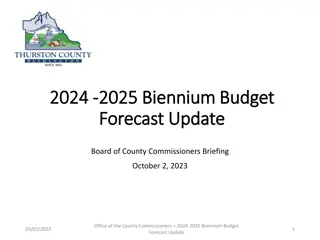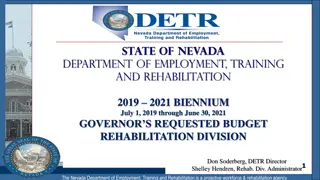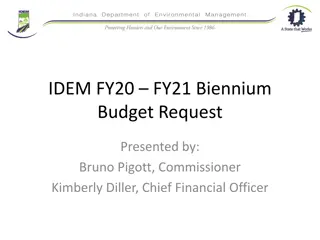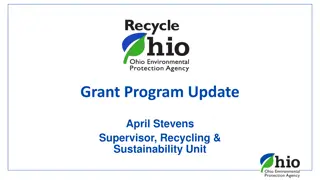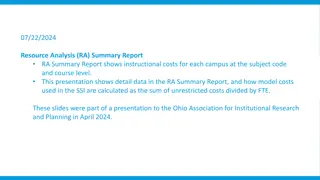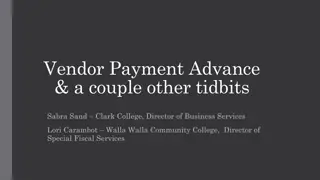Understanding Biennium Crossover and Its Impact on Grant Budgets
Exploring the concept of biennium crossover and its implications on grant budgets, this article delves into the basics of the state of Washington's biennium structure, including the significance of Month 25 in parallel accounting. Discover how this transition period affects budget tracking, reporting accuracy, and potential challenges in financial operations during the crossover phase.
Download Presentation

Please find below an Image/Link to download the presentation.
The content on the website is provided AS IS for your information and personal use only. It may not be sold, licensed, or shared on other websites without obtaining consent from the author. Download presentation by click this link. If you encounter any issues during the download, it is possible that the publisher has removed the file from their server.
E N D
Presentation Transcript
GCA FORUM APRIL 24, 2019
WELCOME Bathrooms are located around the corner to the right. We have prepared material for the entire hour. We want you to be engaged. This meeting is for you! Please ask us questions!!
Short Introduction Please introduce yourself! Name Department
Agenda Biennium Crossover Compliance Tips and Tricks Advance Budgets Facilities & Administrative Costs MTDC and other bases Requesting Org Code Changes Upcoming Workshops
BIENNIUM CROSSOVER Impacts on Grant Budgets
Biennium Overview (the basics) A State of Washington biennium covers two fiscal years, from July of an odd year through June of the next odd year. This two-year period includes 25 accounting months (more on that in a moment). Bienniums are named for the year they begin. We are currently in the waning months of the 2017 Biennium. The 2019 Biennium will run 7/1/19-6/30/21. At biennium crossover, the expiring biennium s records are closed and a new set of records is opened. While this primarily applies to state budgets, the process impacts all UW budgets, including sponsored projects. Want more details, including key dates for transaction processing? Go here: https://finance.uw.edu/ps/reports-reconciliation/bienniumclose
Month 25? What is this wizardry? During month 25, the old biennium runs in parallel with the new one to allow state agencies to ensure that any trailing costs are posted to the biennium in which they were incurred. In practical terms, this means that for most of July, charges will be posting to both biennia. Month 25 charges belong to June and are shown as June charges in MyFD, but can post through most of July, well after the normal month-end close. Meanwhile, ordinary July expenditures will post to Month 1 of the new biennium.
But what does this have to do with grant budgets? All budgets will look weird in MyFD during the transition period. Various UW systems may be unavailable at times. Be aware of possible impact on deficit transfers. Interim reports and invoices for periods ending 6/30/19 may not match MyFD totals. Act fast if you are reporting non-FEC cost share transactions from a state budget.
What do you mean by look weird? For several weeks during the transition period, your award amount won t show in MyFD s Budget Summary. BUT, you can still see it in GrantTracker. Your award hasn t gone anywhere.
More Weirdness You ll see transactions like these in your July Transaction Summary. Ignore them they re system transactions related to the biennium crossover and do not impact your budgeted amount or expenditures.
Systems unavailable? Systems necessary for processing transactions may be down during parts of the crossover period. This link should have planned outages listed closer to the dates: https://itconnect.uw.edu/work/ad ministrative-systems/keynes-hours/ In general, allow extra time for all your budget management activities in July.
Deficit Transfers When using the Deficit Transfer tool on the GrantTracker website in July, check the GCA website for the date these transfers will switch from the 2017 to the 2019 biennium. If you want to request a 2019 biennium transfer before that date, do NOT use the Deficit Transfer tool. Instead, email gcahelp@uw.edu or submit a GrantTracker request under the Closing topic.
Interim Reports and Invoices Interim reports and invoices for periods ending June 30thare generally due before Month 25 is complete. To meet sponsor deadlines, GCA will treat 7/5/19 as the last day of June. The invoice/report will NOT include Month 25 charges, even though they will ultimately show as June charges in MyFD. It WILL include any July charges that post 7/1-7/5/19, though these will show as June charges in MyFD. With monthly invoices, the sum of the June and July invoices should match that of the June/July MyFD Transaction Summaries. If you are providing backup for a report/invoice, you will need to use these dates as well. You can access this information through the B.I. Portal (Decision Support in MyFD s More Systems menu).
B.I. Portal Access Choose Decision Support from the MyFD MORE SYSTEMS dropdown.
Select Variable Reporting Period Transaction Summary and click Run Report.
Biennium Crossover and Non-FEC Cost Share Transactions on biennium-based budgets will no longer be available for tagging as non-FEC cost share contributions once the biennium has closed. While we always encourage departments to report non-FEC cost share frequently (preferably quarterly), this limitation makes it especially critical leading up to the crossover.
Identifying biennium budgets in MyFD Not a Biennium Budget: Biennium Budget:
Biennium Summary Review the Biennium Cutoff Date Calendar regularly. Mark key dates on your own calendar. If you need help, ask! Tag cost share contributions ASAP. Be patient by mid-August, everything will back to normal!
UNALLOWABLE EXPENDITURES Contributions or Donations
Compliance Case Study: Round Up & Donate GCA Received a Statement of Difference/Invoice Suspension from NIH Reason for notice was a Contractor s monetary donation to charity: Sponsor reviewed the backup documents attached to the invoice Upon inspection it was discovered that Contractor added a donation to their Lyft charges (Round Up & Donate) Contractor included these donations when they sent UW an invoice for reimbursement Per Federal Acquisition Regulation (FAR) 31.205-8 Contributions or Donations this is an unallowable expenditure.
GCA Will Notify Department When GCA receives these notifications from the sponsor a copy of the notice will be forwarded to the department contacts. The department will need to remove the unallowable amount from their budget and onto a non-sponsored budget Departments are strongly encouraged to review all receipts for these types of transactions Make sure you deduct these expenditures from the final amount of reimbursement
REPORTING EXPENSES TO THE SPONSOR Early Interim Invoices and Interim Reports
Early Interim Invoice Requests During Year End closing periods for sponsors (typically June 30 or December 31) GCA will receive requests for early interim invoices (invoices generated before the month has closed in the UW system) Generating these invoices has led to numerous issues later on: Duplicate expenditures due to errors in manual manipulation of invoicing system Additional invoices for the same month because not all expenditures are accounted for on the first invoice This causes confusion with the sponsor and some have initially refused to pay the 2ndinvoice Erroneous billing periods generated on future invoices
Early Interim Invoice Requests If a sponsor asks for an early interim invoice let them know that the UW has not closed out the month and not all expenditures have posted to your budget. Ask the sponsor if they are willing to accept an estimate of expenses that they can use to accrue in their system. If you are uncomfortable with pushing back on the request forward the request to GCA (gcahelp@uw.edu) and we will be happy to do it for you.
Including Late Posting Charges on Interim Reports When GCA completes a required report for a sponsor we use the expenditures posted in MyFD. Departments sometimes ask us to include expenditures that post (or will post) after the time period the sponsor wants us to report on. This causes compliance issues because we are no longer matching what is reported in the UW accounting system (which is considered the official financial record) This also makes it hard for our Reporting team to reconcile when they prepare the next report
Including Late Posting Charges on Interim Reports If the sponsor wants to know how much you have spent during a certain time period let them know about pending charges that occurred during that time, but have not posted yet in the progress report In the extreme event that you may lose funding because your sponsor is monitoring your spending rate GCA can create an Ad Hoc report for the sponsor The report is in addition to the require sponsor report GCA will still use the information from MyFD to create future required reports
ADVANCE BUDGETS
What is an advance budget? A temporary budget for new and renewal awards that haven t been fully executed. Advance budgets will appear in MyFD with a budget name starting with xxxADVxxx All funding will be allocated to 36-00, unless it s a clinical trial budget. You can charge advance budgets as you would regular award budgets. No invoicing or reporting, since there is no fully executed award agreement and these are not actual award funds. Advance budgets are guaranteed by department funds, meaning if the award doesn t come through the department is responsible for all costs.
When should you request an advance budget? When you don t expect the award agreement to be fully executed by the award start date and need to begin charging project expenditures. OR - when an existing award will be continuing, but doesn t have automatic carryover, making it ineligible for a supplement/extension. Establishing a renewal advance budget will allow you to continue posting project expenditures.
Why should you request an advance budget? Allows you to charge project expenditures to their own budget, as opposed to an unrelated budget (state budget, etc.) and having to transfer them off later. Expense transfers can be an audit risk.
How do you request an advance budget? Advance budget requests are initiated through the Advances tool in SAGE. After you complete and sign the Advance Budget Number Request Form, it should be sent to GCA either via email or GrantTracker. Instructions and policy guidance available in GIM 09. When the advance request is processed by GCA, you will receive an automatically generated email notification.
What if you need to extend an advance budget? Similar process to requesting a new/renewal advance budget submitted through SAGE. In the Advance tool, select the Extension option. Advance budgets can be extended up to a year from the budget start date without GCA manager approval. Budgets should not be in advance status for extended periods. Anything greater than a year will be reviewed for viability
Taking budgets out of Advance GCA will take the budgets out of advance when the award Funding Action (FA) is processed. Advance funds will be replaced with actual award funds. Invoicing and reporting schedule will be set up in our system (if applicable). If there are sub budgets in advance, we generally require TPUs to take them out of advance after the FA is processed, unless all the sub budget details/budget breakdowns are attached to the eGC1 and don t require additional clarification. If the award start date is different from the advance start date, we will change the budget start date to the former, except when pre-award spending is allowed. If pre-award spending is not allowed, you will need to transfer off the unallowable charges unless you are able to obtain sponsor approval for those charges.
F&A BASES The What, Why, and How
Overview of F&A GIM 13 Facilities and Administrative (F&A) Rates a.k.a Facilities and Administrative Costs, Indirect Costs or IDC F&A costs or IDC are used to recover infrastructure support costs associated with sponsored research and other sponsored projects. Such support costs are incurred for common or joint objectives, and cannot be fully allocated to a specific activity/project. Examples: Depreciation and interest cost of the University s buildings Operating and maintenance costs Common administrative functions (payroll, purchasing, etc.) When we bill the sponsor, we include F&A on the direct costs incurred. Are all direct costs on a budget subject to F&A? Depends on the base!
What is a base or indirect cost base ? F&A costs are charged as a percentage of direct costs incurred. F&A bases are how we identify what direct costs are included or excluded from the calculation of indirect costs. F&A bases are used to negotiate our standard F&A rates with our cognizant agency. Department of Health and Human Services (DHHS), Division of Cost Allocation (DCA), San Francisco office GCA implements the use of bases in our financial systems to ensure we are charging IDC correctly. We can easily identify the included or excluded direct costs by using object codes.
F&A Bases at UW GIM 13, Executive Order 34 and F&A Rate Agreement The F&A base is shown on the funding action we receive from OSP and is entered into our accounting system. GCA must enter the correct IDC rate and base in the financial system so that IDC expenditures are calculated correctly and the department can view an accurate budget balance. If the rate or base is incorrect at setup or changes at a later date, GCA must process an adjustment JV to make the correction. F&A is typically applied to the MTDC of awards, unless program announcement states otherwise. MTDC is also the standard base used when Standard UW F&A rates are negotiated with the cognizant agency.
F&A Bases at UW continued GCA currently has 32 bases, 1 of which was retired August 2018 Can range anywhere from: Total Direct Costs (TDC) Base 11 Represents the total direct costs of a sponsored agreement Modified Total Direct Costs (MTDC) Base 18 or 38 (retired) Defined in 2 CFR 200.68 Most common base Any additional exclusions must be approved by the cognizant agency for indirect costs.
Modified Total Direct Costs (MTDC) MTDC means all direct salaries and wages, applicable fringe benefits, materials and supplies, services, travel, and up to the first $25,000 of each subaward (regardless of the period of performance of the subawards under the award). Excludes: 01-50 Postdoctoral Research Trainee Salaries 01-90 Graduate Stipends 03-04 Research Storage, Computing and Cloud 03-27 Inpatient Hospital Charges 03-32 Outpatient Hospital Charges 03-38 Vessel Usage Charge (Vessel owned by UW) 03-62 Subcontracts (subawards), beyond the first $25,000 in expenditures 03-80 Rentals buildings and space 05-47, 05-48 & 06 Equipment 08-01, 08-02, 08-05 & 08-08 Student Aid and Other Grants and Subsidies (scholarships, stipends, tuitions and fees) 19-40 Fixed Fee Other items may only be excluded when necessary to avoid a serious inequity in the distribution of indirect costs, and with the approval of the cognizant agency for indirect costs.
What was this base 38 business? Budgets set up with base 18 may have also been base 38 at one point Base 38 Started in 2010 in place of base 18 Attempt to have our system auto-calculate F&A on the first $25,000 of each subcontract only, to comply with MTDC This did not go as planned GCA had to perform manual adjustments for broken base 38 budgets Base 38 retired in August 2018 Back to base 18 and manual adjustments for budgets with subcontract charges
ORG CODE CHANGE REQUESTS
How to request org code changes Changing org codes on 5 budgets or fewer? Send a GrantTracker on each budget. Changing org codes for more than 5 budgets at once? Use the new Bulk Org Code Update form under Revisions to Existing Budgets on the GCA Budget Setup page: https://finance.uw.edu/gca/award -lifecycle/budget-setup
GCA WORKSHOPS What would you like to learn more about?
CORE (shameless plug) Collaborative for Research Education (CORE) is dedicated to providing FREE training pertaining to research administration. Website: https://www.washington.edu/research/training/core/ GCA will be developing new classes where we can go into more detail on topics that are more complex, or hard to remember.
Potential Topics Relinquishments Process for when PIs transfer institutions Carry Forward How do I know if I have carry forward? Closing an award with a deficit or surplus balance Cash Payments Short pays Unpaid invoices Refusal to pay Invoicing and voiding invoices Refunds from Vendors (Reverse Expenditures) Awards in Foreign Currency Forms-when to use them and how to complete them! Suggestions??
Thank you! The Summer GCA Forum is scheduled for Tuesday, August 13that 11 AM.
